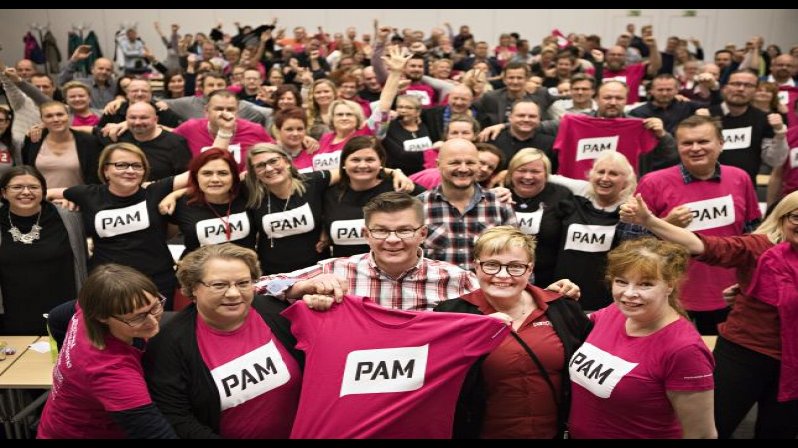Collective agreement negotiations kick off amid pressures for wage increases in euro terms
The social partners’ calendars are filling up with negotiations in the major sectors. Collective Bargaining Director Jaana Ylitalo knows that when it comes to pay the employees’ minimum is the employers’ maximum.
Autumn has given way to winter in the labour market, and collective agreement negotiations in the major PAM sectors will get underway in earnest this week.
"All in all we need to improve pay in the PAM sectors, and that means across the board increases in euro terms", says PAM’s Collective Bargaining Director Jaana Ylitalo.
The situation is challenging.
"These euro-denominated objectives are not in line with the maximum increase envisaged by employers. For the negotiations in PAM’s sectors, increases in line with the wage settlement in the technology industry that dragged on all autumn are the maximum for the employer side, but for PAM it’s the minimum."
The euro-denominated objectives are not in line with the maximum increase envisaged by employers
PAM President Ann Selin points out that for service sectors, tracking the 1.6 per cent increase in the industry settlement would typically mean around 35 euros a month. Pay in industry is higher as it is, so for them it means around 45 euros a month. So the pay gap would get bigger. If the increase is 45 euros, the scheduled pay gap would stay the same.
"But our objective is to narrow the pay gap", Selin states.
Working conditions are now negotiated by collective agreement, not centrally, and so different sectors should be able to make settlements that are right for them. Selin is surprised how, in spite of this, employers have coordinated closely to make the industry settlement a ceiling for wage rises.
"I for one am rebelling against that."
Selin says that in the hospitality sector, for example, you often come across employers complaining that competent employees are hard to come by. In her opinion one solution to this could be a sustained programme to raise earnings levels in the sector.
Last Friday Ylitalo commented on the upcoming union round on the Ykkösaamu show on Yle Radio 1, and stressed that the pay gap between women and men must not become entrenched. She also stated that the current economic growth is also creating pressure for pay rises.
Ylitalo points out that as well as pay there are very important aspects of working conditions on the table which PAM’s negotiators are keen to take forward. These include issues around part-time and temporary employment and an overhaul of vocational training. The latter has introduced new pressures into workplaces which, on top of doing a job of work, are responsible for things like organizing training for competence-based qualifications.
Timetables for negotiations
Retail sector 11.-12.1.
The retail collective agreement negotiators had their first meeting before Christmas, and the next meeting of the Finnish Commerce Federation and PAM’s representatives will be at the end of next week on 11 and 12 January. After that meetings have been agreed for a couple of days a week until the end of January.
Hospitality sector 10.1.
The Finnish Hospitality Association MaRa and PAM are meeting for a second time since the autumn following the stormy negotiations in the ski centre and activity programme sectors with the lock-out imposed by employers. The situation was only resolved with the help of the National Conciliator, and by the end of December most ski centre employees were already covered by new, locally agreed working conditions.
After the start of negotiations on Wednesday, further meetings have been agreed weekly until the end of January. The upcoming negotiations will also agree on working conditions for train service personnel working for Avecra Oy.
Facilities services sector 12.1.
Working conditions for cleaners and facilities workers will be negotiated on Friday 12 January, when PAM meets representatives of the Real Estate Employers.
Pharmacy sector 17.1. PAM will meet the Pharmacist Employers Association of Finland.
Negotiations in special sectors concluded, ongoing and ahead
PAM is meeting representatives of the Service Sector Employers PALTA regularly, since the agreements in some sectors have expired or are expiring. The agreements in special industry, the copying and printing sector and the household appliance, domestic equipment service and service machine sector will end at the end of January. Since the start of the year there has been no valid agreement at Makuuni and there has been no agreement in the golf sector since November.
An agreement for cinemas in line with the competitiveness pact was reached with PALTA last year. Because the agreement for employees in the sector had ended at the end of February, the working conditions of the old agreement were applied up till then. There was no pay increase for this year, but for the two following years increases will track the pay settlements in the chemical and technology industry.
A new collective agreement entered into force for the haircare sector in June, and in the autumn pay increases were agreed for the first year only. Accordingly, hairdressers’ wages in member businesses of the haircare entrepreneurs association went up by 1.5 per cent from the start of November. The sector avoided extensions to working time under the competitiveness pact, bonuses went up, the principles of local agreement were agreed upon, and occupational health and safety was brought up to European standards.
Security guards will still have to wait, since their agreement only expires at the end of April, and negotiations will be held in late spring. The collective agreement for photo service studios will expire at the end of January, and new conditions and pay will be negotiated with the special sectors’ employers’ association.



